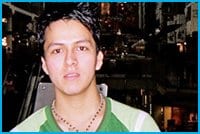Alvaro Orozco shows up for our meeting 15 minutes late, out of breath and nervous. He misunderstood where we were to meet and went to the wrong location. He apologizes profusely.
Despite his frenzied state, he looks good. He’s well-dressed and deeply tanned. I didn’t expect him to have spent so much time in the sun.
When I ask him about it he’s all smiles and tells me he just got back from a weekend camping trip to Muskoka with the queer group Supporting Our Youth. He went canoeing, saw waterfalls and slept under the stars, the first time he’d seen them since coming to Canada.
It’s the freedom to “enjoy his gay life” that he says makes him want to stay in Canada. It’s part of the reason he’s been in hiding since a deportation order was issued against him on Aug 9 to send him back to his native Nicaragua. It’s a country he hasn’t seen in almost 10 years since he says he fled his abusive father at age 12.
“My life in Nicaragua was really hard, because I was just a kid,” he says. “My father, he’s homophobic so he don’t like that. He’s a violent person. For years and years he beat me all the time because he knew in some ways I was different and he wanted to change my way of thinking or living. He said maybe that was the only way to change my life and make me straight.”
Orozco says he left home on foot and spent the next 18 months on the 2,500 kilometre journey from Managua to the United States. He says he sneaked through jungles across four borders. He supported himself by taking odd jobs in retail, service, and agriculture in Guatemala and Mexico until he could afford a bus ticket to the US border where he swam across the Rio Grande into Texas.
“I took some pages from my book, a map, and I decided to walk and ask for rides. That was the only way because if I go to any country’s consul and I ask for a visa, they ask you for ID, passport and so many things I didn’t have,” he says. “The only way to leave my country was illegally.”
At 14 Orozco found work in construction and landscaping in the bustling underground US market for illegal immigrants. He says he found shelter with members of the Seventh Day Adventist Church but supported himself through his work. He recalls that he was refused entry to US public high schools because of his illegal status so he pursued night classes in English.
After five years in the US Orozco says he finally sought help to immigrate to Canada when US officials denied him refugee status and issued a deportation order.
“The gay life in US is not so open as it is in Canada,” says Orozco. “It was so hard because I was illegal so I had no rights. I was looking on the internet and I found that the gay life in Canada is more open and they have a law that you can feel safe so I decided to come and apply for refugee status.”
Orozco’s application was denied by a Canadian Immigration and Refugee Board (IRB) adjudicator who ruled that Orozco wasn’t actually gay because he did not pursue same-sex relationships while living in the US. Orozco says that decision didn’t take into account his precarious circumstances as an illegal immigrant.
“All of my friends are from the church and they don’t know about me, that I am gay,” he explains. “It was hard to say that I am gay and I was only 14 to almost 19 and I was so young and it was so hard because at the same time I was thinking that I could lose my friends.”
Despite living in Toronto as an openly gay man for three years Orozco is still shy when it comes to talking about dating, relationships or nightlife. He says he’s never had a boyfriend or dated seriously.
A nervous stutter becomes noticeably worse as I ask about places he likes to go.
“I go out with friends to the clubs and any place where I can feel free,” he says. “I like to go to any gay clubs. I don’t have anything specific. I like to go to a movie or go with my friends to anywhere, the museum, the library. As anyone gay or straight, I go to anywhere in Toronto. I enjoy my gay or straight friends with a coffee in the gay village.”
Orozco’s case has also received media attention in Nicaragua, where gay sex is a crime and queers can face prosecution. In a rare recent communication with his mother — the only family he still speaks to — Orozco says that she told him she saw him on TV, knows that he’s gay and thinks that Canada is the safest place for him.
Orozco is now hoping that immigration minister Diane Finley will issue a stay of his deportation order or that the IRB will grant him status on humanitarian and compassionate grounds.
“It’s not so easy when you don’t know what can happen,” says Orozco. “Some days it’s scary, some days I’m hoping. I’m still waiting for any good news.”
But he refuses to think about being sent back to Nicaragua. He has grand plans for life in Canada when he gets official status and hopes to finish high school and go to college or university to become an architect, nurse, or study international relations so he can work for human rights.


 Why you can trust Xtra
Why you can trust Xtra


